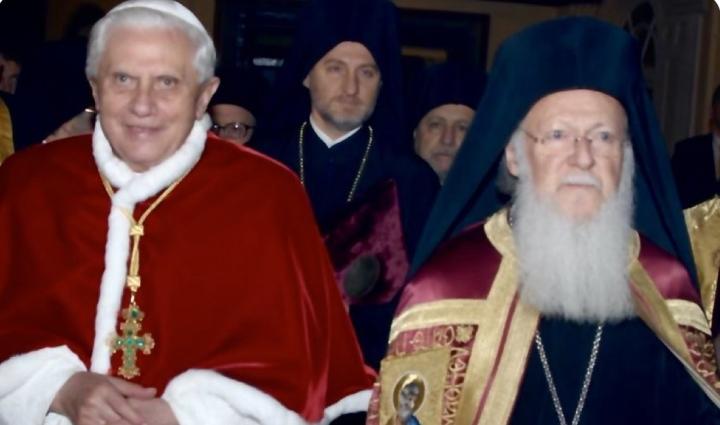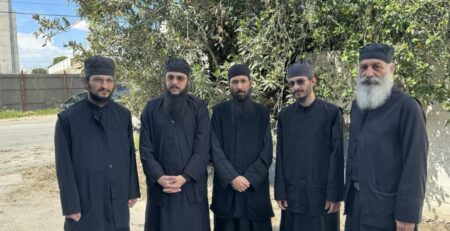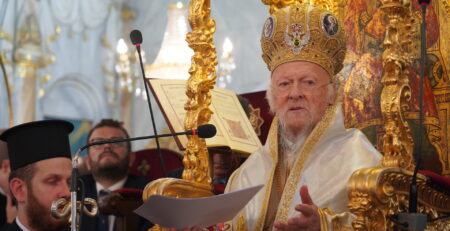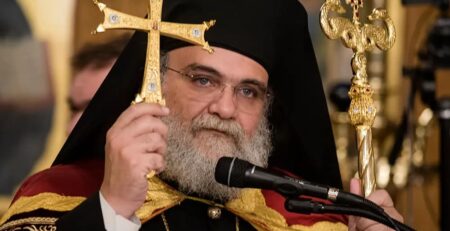ΠΑΠΑΣ ΒΕΝΕΔΙΚΤΟΣ XVI Εις μνήμην
Του Οικουμενικού Πατριάρχη Βαρθολομαίου
Είναι ξεχωριστή τιμή να αποτίσουμε έναν ταπεινό και αδελφικό φόρο τιμής σεβασμού, ευγνωμοσύνης και αγάπης στον εκλιπόντα Πάπα Βενέδικτο XVI, τονίζει ο Οικουμενικός Πατριάρχης Βαρθολομαίος , σε άρθρο του στην ιταλική εφημερίδα L’Osservatore Romano.
Στο άρθρο του ο κ. Βαρθολομαίος σημειώνει μεταξύ άλλων:
“Έτσι, με την ευκαιρία της εκλογής του στις 19 Απριλίου 2005, προσκάλεσα αυθόρμητα τον Πάπα Βενέδικτο στο Φανάρι σε μια συμβολική χειρονομία, που είχε σκοπό να αντικατοπτρίζει την προηγούμενη επίσκεψη του Πάπα Ιωάννη Παύλου Β’ στο Φανάρι, με πρόσκληση του προκατόχου μας Πατριάρχη Δημητρίου, μετά την εκλογή του ως πάπα στις 16 Οκτωβρίου 1978. Ένα χρόνο μετά την έναρξη της παπικής διακονίας του, ο Πάπας Ιωάννης Παύλος Β’ παρευρέθηκε προσωπικά στη Θρονική Εορτή του Οικουμενικού Πατριαρχείου στις 30 Νοεμβρίου 1979, όταν ιδρύθηκε η Μικτή Επιτροπή Θεολογικού Διαλόγου μεταξύ της Ρωμαιοκαθολικής Εκκλησίας και της Ορθόδοξης Εκκλησίας και ανακοινώθηκε επίσημα.
Από την πλευρά του, δεκαοκτώ μήνες μετά την εκλογή του, ο Πάπας Βενέδικτος ΙΣΤ’ παρέστη προσωπικά στη Θρονική Εορτή του Οικουμενικού Πατριαρχείου στις 30 Νοεμβρίου 2006, σηματοδοτώντας την επανέναρξη και ανανέωση του επίσημου θεολογικού διαλόγου μεταξύ των εκκλησιών μας. Στην κοινή μας δήλωση στις 30 Νοεμβρίου 2006, «εκφράσαμε τη βαθιά μας χαρά για την επανέναρξη του θεολογικού διαλόγου, ο οποίος είχε διακοπεί για αρκετά χρόνια λόγω διαφόρων δυσκολιών, αλλά τώρα η Επιτροπή μπόρεσε να εργαστεί εκ νέου με πνεύμα φιλία και συνεργασία». Μέσα από τους σπόρους της προσωπικής μας φιλίας και τα αποτελέσματα των επίμονων προσπαθειών μας με τον Πάπα Βενέδικτο, το 2006, ο διάλογος μεταξύ των εκκλησιών μας τελικά επανήλθε στο Βελιγράδι της Σερβίας. Και το γεγονός ότι η κοινή επιτροπή μπόρεσε να επιστρέψει στη θεολογική της ατζέντα και να σημειώσει νέα πρόοδο οφειλόταν σε μεγάλο βαθμό στη θεολογική ανδρεία του Πάπα Βενέδικτου και του Μητροπολίτη μας Περγάμου Ιωάννη”.
*Παρατίθεται το άρθρο στην ιταλική και στην αγγλική γλώσσα από την ιστοσελίδα του Οικουμενικού Πατριαρχείου
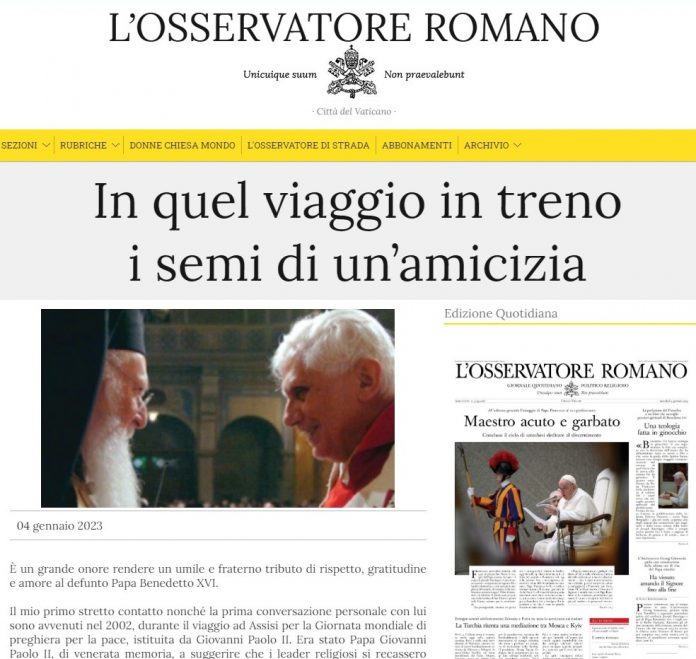
In ricordo di Joseph Ratzinger – Benedetto XVI
- articolo di S.S. Bartolomeo, Patriarca Ecumenico sul quotidiano L’Osservatore Romano
È un grande onore rendere un umile e fraterno tributo di rispetto, gratitudine e amore al defunto Papa Benedetto XVI.
Il mio primo stretto contatto nonché prima conversazione personale con Papa Benedetto XVI è avvenuto nel 2002, durante il viaggio per la Giornata Mondiale di Preghiera per la Pace di Assisi, istituita da Papa Giovanni Paolo II. Era stato Papa Giovanni Paolo II, di venerata memoria, a suggerire che i leader religiosi si recassero insieme ad Assisi in treno per dimostrare il loro percorso interiore di consapevolezza spirituale insieme al loro pellegrinaggio esterno di comprensione religiosa. Colsi l’opportunità per invitare l’allora Cardinale Joseph Ratzinger a sedersi accanto a me, nello stesso scompartimento, durante il viaggio in treno. Quell’occasione piantò i semi di un affetto profondo e di una collaborazione pastorale durata due decenni.
Per me quell’incontro nel viaggio verso Assisi fu molto più che un’espressione accidentale o informale di solidarietà e unità. Di fatto, non ci volle un grande sforzo perché noi due diventassimo intimi. In effetti, riconoscemmo subito di essere della stessa risma, di apprezzare tutti e due il principio del dialogo – e tutto ciò perché entrambi condividevamo lo stesso obiettivo di unità e comunione in Gesù Cristo. Quel momento e incontro personale profondo plasmò il nostro rapporto durante tutto il pontificato di Papa Benedetto. Suggellò la fiducia e la convinzione che avevamo in comune circa la nostra responsabilità –sia una vocazione sia un impegno – di sostenere la fede in un mondo secolarizzato e al tempo stesso di promuovere l’unità in una cristianità divisa.
Inutile dirlo, l’allora Cardinale Ratzinger era già uno studioso teologo molto rinomato. E aveva influenzato profondamente molti studenti ortodossi, attraverso i quali – mi confidò una volta – aveva imparato a conoscere e ad amare la teologia e la tradizione d’Oriente molto più che attraverso i libri. Tra quegli studenti vi erano color che poi sarebbero diventati il Metropolita della Svizzera Damaskinos e l’Arcivescovo Stylianos dell’Australia. Il primo fu essenziale per la preparazione del Santo e Grande Concilio della Chiesa Ortodossa, che infine si riunì sull’isola di Creta nel 2016, come pure nella promozione del dialogo interreligioso. Il secondo fu fondamentale nei dialoghi ecumenici bilaterali e multilaterale, servendo anche come co-presidente fondante del Dialogo teologico cattolico-ortodosso iniziato nel 1980.
Così, in occasione della sua elezione il 19 aprile 2005, spontaneamente invitai Papa Benedetto al Phanar, con un gesto simbolico che intendeva rispecchiare la precedente visita di Papa Giovanni Paolo II alla Sede del Patriarcato Ecumenico su invito del nostro predecessore il Patriarca Demetrio, dopo la sua elezione a Papa il 16 ottobre 1978. Un anno dopo l’inizio del suo ministero papale, Papa Giovanni Paolo II partecipò di persona alla Festa del Trono della Chiesa di Costantinopoli il 30 novembre 1979, quando venne formalmente annunciata l’istituzione della Commissione mista internazionale per il Dialogo teologico tra la Chiesa cattolica e la Chiesa ortodossa.
Da parte sua, diciotto mesi dopo la sua elezione, Papa Benedetto XVI partecipò di persona alla Festa del Trono del Patriarcato Ecumenico il 30 novembre 2006, segnando la ripresa e il rinnovamento del dialogo teologico tra le nostre Chiese. Nella nostra dichiarazione comune del 30 novembre 2006, “abbiamo espresso la nostra gioia profonda per la ripresa del dialogo teologico. Dopo un’interruzione di qualche anno, dovuta a varie difficoltà, la Commissione ha potuto lavorare di nuovo in uno spirito di amicizia e di collaborazione”. Fu grazie ai semi della nostra amicizia personale e i risultati dei nostri sforzi persistenti insieme con Papa Benedetto che infine, nel 2006, riprese il dialogo tra le nostre Chiesa a Belgrado, in Serbia. E il fatto che la commissione congiunta riuscì a ritornare alla sua agenda teologica e compiere nuovi progressi fu merito, in non poca misura, dell’abilità teologica di Papa Benedetto e del nostro Metropolita Giovanni di Pergamo.
Nello stesso storico documento di novembre 2006, concordammo anche sulla necessità di “rafforzare le collaborazioni e la nostra testimonianza comune davanti a tutte le nazioni”. Inoltre, dichiarammo di incoraggiare “a stabilire rapporti più stretti tra i cristiani e un dialogo interreligioso autentico e leale, per combattere ogni forma di violenza e di discriminazione” e di “impegnarci per un rinnovato servizio all’uomo e per la difesa della vita umana, di ogni vita umana”. Infine professammo che “[c]ome capi religiosi, consideriamo come uno dei nostri doveri incoraggiare e sostenere gli sforzi compiuti per proteggere la creazione di Dio e per lasciare alle generazioni future una terra sulla quale potranno vivere”.
Meno di due anni dopo, a ottobre 2008, Papa Benedetto ci invitò a tenere un discorso formale, centrale – su “La parola di Dio nella vita e nella missione della Chiesa” – a più di quattrocento cardinali e vescovi durante la XII Assemblea Generale Ordinaria del Sinodo dei Vescovi della Chiesa cattolica. Quello storico evento si svolse nella splendida Cappella Sistina dopo la solenne celebrazione dei Vespri. Era la prima volta che un Papa di Roma aveva chiesto a un Patriarca ortodosso di pronunciare il discorso di apertura di un sinodo generale dei vescovi. Fu un dono immenso e un onore inestimabile che rimarrà sempre custodito nel profondo del mio cuore e nella storia della nostra Chiesa.
Ho avuto il privilegio di lavorare a stretto contatto con tre Romani Pontefici negli ultimi trentun anni del mio ministero patriarcale. Il 29 giugno 2008, in una delle sole tre occasione in cui ho partecipato alla Festa Patronale dei santi Pietro e Paolo in Vaticano, ho espresso a Papa Benedetto l’assicurazione che la mia presenza rappresentava “un gesto rispettoso di gratitudine autentica per ricambiare la sua presenza personale, Santità, diciannove mesi fa, in occasione della Festa di Sant’Andrea, primo chiamato degli Apostoli e fratello più anziano di san Pietro, fondatore e patrono dell’antica sede della Nuova Roma“. Durante il pranzo che seguì la celebrazione solenne nella Basilica di San Pietro aggiunsi: “Storicamente queste visite hanno incluso scambi fondamentali tra le nostre due Chiese, come espressione tangibile di una maggiore comunicazione attraverso il dialogo teologico e nell’orante attesa della piena comunione sacramentale nel Corpo di Cristo”. Quell’incontro segnò anche l’inaugurazione ufficiale dell’Anno Paolino dopo la nascita dell’Apostolo Paolo due millenni prima, e entrambi promettemmo di sostenere le reciproche feste.
Abbiamo continuato a corrispondere a comunicare con Papa Benedetto per molto tempo dopo le sue modeste e tuttavia monumentali dimissioni dal papato. Gli ho ricordato spesso i nostri scambi personali nel corso degli anni, e addirittura gli ho fatto gli auguri per il triplice anniversario celebrato nel mese di aprile, ovvero la sua elezione, l’inizio del suo pontificato e il suo compleanno. Ha sempre apprezzato che lo andassi a trovare nel suo modesto monastero, dove ricordava i nostri incontri e identificava con orgoglio vari souvenir dei quali gli avevo fatto dono. “Questi oggetti – mi scrisse una volta – non erano solo segni commoventi della nostra amicizia personale, ma anche indicazioni verso l’unità tra Costantinopoli e Roma, segnali di speranza che stiamo procedendo verso l’unità”.
Possa l’anima gentile del mio amato fratello Papa Benedetto XVI riposare nella pace eterna. E possa l’importante contributo della sua vita e della sua opera risiedere nell’ eterna memoria.
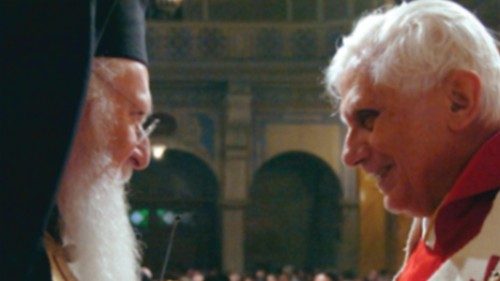
______
[English translation]
It is a distinct honor to pay a humble and fraternal tribute of respect, gratitude and love to the late Pope Benedict XVI.
My first close contact and personal conversation with Pope Benedict XVI took place in the year 2002 on the way to the World Meeting of Prayer in Assisi that was initiated by Pope John Paul II. It was the suggestion of the late Pope John Paul II for religious leaders to travel together by train to Assisi in order to demonstrate their inner journey of spiritual awareness alongside their external pilgrimage of religious understanding. I took the opportunity to invite then Joseph Cardinal Ratzinger to sit beside me in the same compartment for the train ride. That occasion planted the seeds of a mutual affection and pastoral alliance that endured for two decades.
For me, this meeting along the way to Assisi was far more than an accidental or informal expression of solidarity and unity. In fact, it required no great effort for the two of us to become close to one another. For we immediately recognized that we were both on the same page, that we both valued the principle of dialogue—and all this because we both shared the same goal of unity and communion in Jesus Christ. This profound moment and personal meeting ultimately shaped our relationship throughout the tenure of Pope Benedict. It sealed the confidence and conviction that we shared about our responsibility—both a vocation and obligation—to advocate for faith in a secularized world and at the same time to advance unity in a divided Christianity.
Needless to say, the then Cardinal Ratzinger was already a theological scholar of great renown. And he had deeply influenced a number of Orthodox students, from whom—as he once confided to me—he learned and loved the Eastern theology and tradition much more so than from books. Such students included the subsequent Metropolitan Damaskinos of Switzerland and the subsequent Archbishop Stylianos of Australia. The first proved pivotal in the preparation for the Holy and Great Council of the Orthodox Church, which finally convened on the island of Crete in 2016, as well as in the promotion of inter-religious dialogue. The second was critical in the bilateral and multilateral ecumenical dialogues, even serving as the founding co-chairman of the Catholic-Orthodox Theological Dialogue that commenced in 1980.
Thus, on the occasion of his election on April 19, 2005, I spontaneously invited Pope Benedict to the Phanar in a symbolical gesture that was intended to reflect the prior visit of Pope John Paul II to the See of the Ecumenical Patriarchate at the invitation of our predecessor Patriarch Demetrios following his election as pope on October 16, 1978. One year after the commencement of his papal ministry, Pope John Paul II personally attended the Thronal Feast of the Church of Constantinople on November 30, 1979, when the establishment of the Mixed Commission for Theological Dialogue between the Roman Catholic Church and the Orthodox Church was formally announced.
For his part, eighteen months after his own election, Pope Benedict XVI personally attended the Thronal Feast of the Ecumenical Patriarchate on November 30, 2006, marking the resumption and renewal of the official theological dialogue between our churches. In our joint declaration on November 30, 2006, “we expressed our profound joy at the resumption of the theological dialogue, which had been interrupted for several years because of various difficulties, but now the Commission has been able to work afresh in a spirit of friendship and cooperation.” It was through the seeds of our personal friendship and the results of our persistent efforts with Pope Benedict that, in 2006, the dialogue between our churches finally resumed in Belgrade, Serbia. And the fact that the joint commission was able to return to its theological agenda and make new progress was due in no small part to the theological prowess of Pope Benedict and our Metropolitan John of Pergamon.
In the same historical document of November 2006, we also agreed that “we must strengthen our cooperation and our common witness before the world.” Furthermore, we declared that “we should encourage the establishment of closer relationships between Christians, and of an authentic and honest interreligious dialogue, with a view to combating every form of violence and discrimination . . . committing ourselves to the renewed service of humanity and the defense of human life, every human life.” Finally, we professed that, “as religious leaders, we consider it one of our duties to encourage and to support all efforts made to protect God’s creation, and to bequeath to future generations a world in which they will be able to live.”

Less than two years later, in October 2008, Pope Benedict invited us to deliver a formal, central presentation—on “the word of God in the life and mission of the church”—to more than four hundred cardinals and bishops during the Twelfth General Ordinary Assembly of the Synod of Bishops of the Roman Catholic Church. The historic event took place in the magnificent Sistine Chapel after a solemn vesperal service. This was the first time that a Pope of Rome had asked an Orthodox Patriarch to offer a keynote address to a global synod of bishops. It was an immense gift and invaluable honor, which shall always be treasured in the depth of my heart and in the history of our Church.
I have been privileged to work closely with three Roman Pontiffs over the last thirty-one years of my patriarchal tenure. On June 29, 2008, at one of only three occasions of attending the Patronal Feast of Saints Peter and Paul at the Vatican, I conveyed to Pope Benedict the assurance that my presence marked “a respectful gesture of genuine gratitude in return for the personal presence of His Holiness eighteen months ago at the Thronal Feast of St. Andrew, First-Called of the Apostles and elder brother of St. Peter, Founder and Patron of the ancient See of New Rome.” At the luncheon that followed the solemn service in St. Peter’s Basilica, I added: “Such visits have historically comprised crucial exchanges between our two Churches as tangible expression of greater communication through theological dialogue and in prayerful expectation of full sacramental communion in the Body of Christ.” That meeting also marked the official opening of the Pauline Year since the birth of the Apostle Paul two millennia ago, and both of us pledged support for one another’s festivities.
We continued to correspond and communicate with Pope Benedict long after his modest yet monumental resignation from the papacy. I would frequently remind him of our personal exchanges over the years, even congratulating him on his threefold anniversaries celebrated during the month of April—his election, his enthronement, and his birthday. He always acknowledged the fact that I visited him in his modest cloister, where he reminisced about our meetings and proudly identified various souvenirs that I had gifted him. “These items,” he once wrote, were “not only endearing signs of our personal friendship, but also signposts toward unity between Constantinople and Rome, signs of hope that we are heading towards unity.”
May the gentle soul of my beloved brother Pope Benedict XVI rest in everlasting peace. And may the momentous contribution of his life and work reside in eternal memory.

